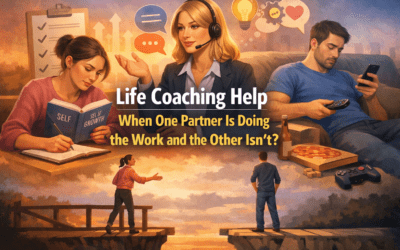COPING STRATEGIES FOR NOT FEELING GOOD ENOUGH
 Day-to-day events can trigger feelings of not feeling good enough…
Day-to-day events can trigger feelings of not feeling good enough…
Someone points out a mistake you made.
You don’t lose weight after weeks of dieting.
Your husband doesn’t notice the effort you made to dress up for the evening.
Your wife doesn’t notice all the other times you remembered to take out the garbage.
You feel bad, so you come up with coping strategies like denial, repressing the feeling or rationalizing why it happened.
The coping strategy is used to compensate for what you feel like you are missing.
HOW I BECAME A CARETAKER
I grew up with a mother and father who were not very involved in my life, so I never felt truly loved or wanted, or like I belonged.
The compensatory behavior I developed was to become a caretaker, because that is what I longed for most.
 As a parent, I pushed myself to go above and beyond to make my children and husband feel loved and give them a sense of belonging.
As a parent, I pushed myself to go above and beyond to make my children and husband feel loved and give them a sense of belonging.
The payoff was that I finally felt like I had a place in the world by taking care of others.
This strategy was driven by my desire to feel loved, so it was strong.
But I still did not feel completely loved or like I belonged, because I never dealt with my original pain of not feeling good enough.
So when my boys became teenagers and I was having trouble in my marriage, I experienced a period of huge disappointment that my love was not reciprocated.
Understanding why you do what you do to feel good enough can lead to lasting change.
Often it takes a big blow or let down to help you see your strategies.
Painful things happen -> Defense Mechanism (denial, repression, rationalization) -> Coping Strategy (action to compensate for insecurity or lack) -> Result (lack of fulfillment)
UNCOVER YOUR COPING STRATEGIES
Here are some common coping strategies we use to feel good enough and how they develop…
When reviewing theses, also consider the behaviors your primary caregivers modeled – especially the one you looked up to or sought approval from.
You may identify with more than one, but one will stand out as the one that drives you the most.
High Achiever. If you use this strategy, you highly driven and have accomplished a lot in your life. You feel the best about yourself when you are achieving. You are acknowledged for your accomplishments and are perceived as successful. You hate failing and if you perceive yourself as having failed you are extremely hard on yourself. You are always thinking of what you can tackle next. You developed this strategy to make up for feelings of being not enough based on criticism, teasing or feeling left out. Or if you were only rewarded for your accomplishments and the reward felt like love.
 People Pleaser or Chameleon. When making sure everyone else is happy and likes you is your top priority. You put others first and do what it takes to avoid upsetting someone else. You avoid confrontation at all costs. Pleasing others makes you feel loved and safe. You can read people in a room and morph to whatever it takes to make them feel at ease. You do what it takes to blend in and avoid negativity. You are outwardly optimistic and act like everything is fine when it isn’t. You probably grew up in a home where there was a lot of fighting or upset or strong personalities, so you became a peacemaker or highly adaptable. You may have developed the chameleon or people pleasing strategy to avoid getting picked on. Or maybe to be a “good” boy/girl you thought you had to put your needs aside to get love.
People Pleaser or Chameleon. When making sure everyone else is happy and likes you is your top priority. You put others first and do what it takes to avoid upsetting someone else. You avoid confrontation at all costs. Pleasing others makes you feel loved and safe. You can read people in a room and morph to whatever it takes to make them feel at ease. You do what it takes to blend in and avoid negativity. You are outwardly optimistic and act like everything is fine when it isn’t. You probably grew up in a home where there was a lot of fighting or upset or strong personalities, so you became a peacemaker or highly adaptable. You may have developed the chameleon or people pleasing strategy to avoid getting picked on. Or maybe to be a “good” boy/girl you thought you had to put your needs aside to get love.
Type A or Control Freak. You get a lot done and love to be in control. You’re a great planner and think everything through and feel best when things go your way. You’d rather do it, than delegate. You find it impossible to “go with the flow.” This strategy developed because your trust was violated in some way and you decided you had to rely on yourself. It can also develop because of an upsetting experience at a young age that caused you to believe that controlling things was the way to prevent the unexpected.
Validation and Approval Seeker. With this strategy you are overly reliant on feedback from outside sources. You desire to be seen, heard and liked. Either your parents made you feel you were the best, so your sense of self worth is dependent on outside validation or you never felt seen or supported by any healthy parent figure, so you are always looking for outside approval to make up for it.
Performer or Comedian. Everyone loves being around you because you keep things light. Going deep or being in uncomfortable situations is torture for you. You prefer to make people laugh or entertain them. You may be sarcastic or eccentric to divert people’s attention from seeing who you truly are. You developed this strategy because you found distraction as a way to keep you safe and fit in somehow. You use humor to avoid being vulnerable because you feel insecure to express your deep feelings. You may have had big feelings as a child but did not feel safe expressing them.
Rescuer or Caretaker. You are the person people call when they need something, because you’ll drop everything to help them. Boundaries are a challenge for you. You find yourself in relationships with needy people and spend more time rescuing them than taking care of yourself. You want to make sure everyone feels like they belong and are extremely sensitive to others needs at the expense of your own. This usually develops as a strategy from feeling responsible to make sure someone else was okay, usually a parent, early on. Your sense of worthiness comes from being there for someone else and you avoid pain by caring for others.
 Perfectionist. You are unsettled by things that are not absolutely perfect. You give 110% to everything you do and worry about always doing it “right.” You have extremely high standards and rarely feel like you measure up. You don’t tolerate mistakes and are very hard on yourself. You delay doing things because everything has to be perfect before you begin. This develops from growing up in a very judgmental environment. Your parents or authority figures were hard on you in the name of love and dished out a lot of constructive criticism that was internalized. Now it fuels the belief that love means pushing yourself hard.
Perfectionist. You are unsettled by things that are not absolutely perfect. You give 110% to everything you do and worry about always doing it “right.” You have extremely high standards and rarely feel like you measure up. You don’t tolerate mistakes and are very hard on yourself. You delay doing things because everything has to be perfect before you begin. This develops from growing up in a very judgmental environment. Your parents or authority figures were hard on you in the name of love and dished out a lot of constructive criticism that was internalized. Now it fuels the belief that love means pushing yourself hard.
Busy Bee. You rarely sit still because there is always something to do. Your schedule is always full and you always feel stressed and overwhelmed, but you get a high from always being on the go. You tend to be a worrywart and experience high levels of anxiety. You take on much more than most people and pride yourself on being busy. This strategy developed from rarely feeling at peace or safe and needing a strategy to distract yourself. It can come from experiencing a highly dramatic situation and not having a support system or tools to process it, which caused the pain to stay lodged inside of you. Keeping busy distracts you from feeling the pain.
Judger. You have an opinion about everything and everyone. You are highly skeptical and need things proved before you trust. You judge yourself harshly, protecting yourself by being harder on yourself than anyone else could be. Your expectations are extremely high. You tell yourself judging is a wise thing to do because it is important to think things through. You talk about things more frequently than you do them and tend to be more pessimistic. This strategy comes from growing up in a fear-based, expectation heavy environment where nothing was trusted until it was evaluated. People with very strong opinions and negativity surrounded you.
THE COST OF COPING STRATEGIES
The cost of a coping strategies are that, although it creates a temporary satisfactory result, it will eventually lead to a let down.
For instance, my cost of being a caretaker eventually built up resentment that I was not getting anything back.
We all get so consumed with pursuing our coping strategies we forget to ask ourselves…
“Who am I and what do I really want?
Click here to find out how to get what you want.
HOW TO BREAK FREE
Did you see your coping strategy above? Ready to let it go and work on feeling good enough?
Click the graphic below and set up a complimentary clarity session so we can get you started!






Recent Comments